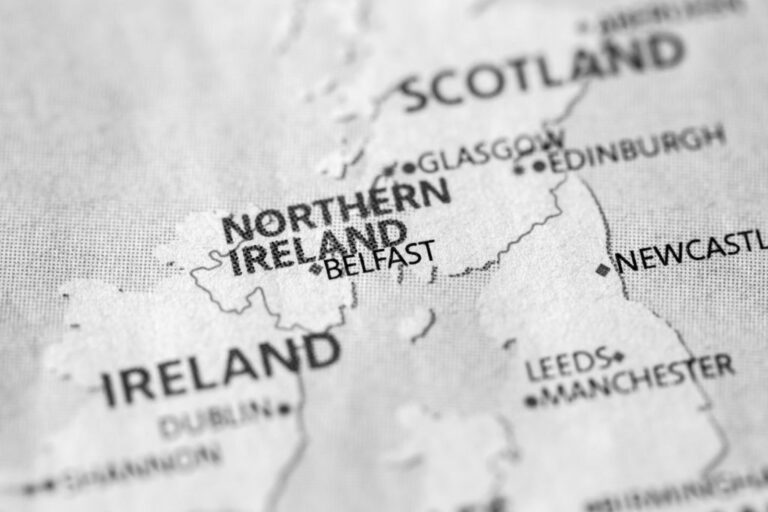
Stephen Booth
Head of the Britain in the World Project at Policy Exchange (2020-2022)
The Northern Ireland Protocol once again threatens to derail the UK-EU relationship. After months of talks between London and Brussels failed to reach mutually acceptable solutions, the Government has reached the conclusion it has no alternative but to start the process of introducing domestic legislation to alter the Protocol.
Everyone, including the EU, recognises that the Protocol has caused major practical problems for traders and consumers in Northern Ireland wishing to access goods from Great Britain. The operation of grace periods and easements means that the Protocol has yet to be implemented in full, yet the Road Haulage Association estimates that the imposition of East-West checks has already added around 30 per cent to the cost of transporting goods.
Ultimately, it is the rapidly deteriorating political situation in Northern Ireland that has left the Government with no alternative but to act. There has been no functioning Executive since the DUP walked out in February. In May’s Stormont elections, every unionist party campaigned against the Protocol, and the DUP has refused to re-engage with the power-sharing institutions until it feels its concerns are being addressed.
Lord Trimble, who won the Nobel Peace Prize for his crucial role in forging the Good Friday Agreement, warned this week that the Protocol is directly threatening the cross-community consent upon which peace was built.
Therefore, as the Prime Minister noted in the Belfast Telegraph, the Government’s twin aims are to ensure the Protocol is altered to respect the balance of the Good Friday Agreement and to see power-sharing restored to Northern Ireland. The Government has stated that its preferred outcome remains a negotiated settlement with the EU, if this is possible.
The hurdles to an agreement remain high. In July, the UK put forward proposals to fundamentally rework aspects of the Protocol, and in October last year the European Commission set out its own package. The UK’s proposals call for parts of the text to be amended, a possibility envisaged under Article 13.8 of the Protocol via mutual agreement. However, the EU has insisted that it will not rewrite the Protocol text and that it is unwilling to change its negotiating mandate to permit this.
The Government notes that several of the EU’s proposals would in fact result in a worse outcome than the status quo under the grace periods. Marks & Spencer’s Chairman, Archie Norman, this week noted that under the EU’s proposals “every piece of butter in a sandwich has to have an EU vet certificate. So it’s highly bureaucratic and pretty pointless. There is no risk to safety. There’s no purpose to these checks.” While Marks & Spencer might be able to cope with the cost, smaller food businesses in Great Britain would have little choice but to cease trading with Northern Ireland.
Meanwhile, the Foreign Secretary’s statement to the Commons that the Government is bringing forward legislation in the coming weeks has yet to convince the DUP to re-engage with the Stormont institutions. The DUP leader’s in the Commons, Jeffrey Donaldson, said this week that his party would block the election of the Speaker to the Northern Ireland Assembly.
However, Donaldson cautiously welcomed Truss’ statement as “a significant move towards addressing the problems created by the Protocol and getting power-sharing, based upon a cross-community consensus up and running again.” He added that he hoped to see progress on the Bill “in order to deal with these matters in days and weeks, not months, and as the legislation progresses, we will take a graduated and cautious approach.” Similarly, the DUP’s Sammy Wilson said his party would judge the Government’s statement when they see a Bill “progressing”.
Given that the proposed Bill will take many months to reach the statute book, the fact that DUP figures have repeatedly mentioned a timeframe of weeks, not months to make their decisions about the Government’s resolve to act, there remains hope that the DUP may re-engage with Stormont while negotiations with the EU continue. This would allow important day-to-day matters in Northern Ireland to be addressed, and illustrate to Brussels the political imperative to reach a solution acceptable to unionists.
It was also notable that there was little Commons dissent from Truss’ statement from One Nation Conservative MPs, who might have been expected to raise serious objections to a unilateral approach to the Protocol. Indeed, Robert Buckland, a recently departed Lord Chancellor, noted that Article 1 of the Protocol is clear that the agreement is to be without prejudice to the Good Friday Agreement. “That means, surely, the Good Friday Agreement takes primacy over the Protocol,” he said. Damian Green welcomed the Government’s framing of the legislation as an insurance policy throughout negotiations with the EU, rather than an attempt to tear up the Protocol.
There has been much speculation about how the EU might react to the Government’s announcement and whether cross-retaliation might lead to a trade war. However, we still seem to be a long way from that point. Maros Sefcovic’s language in response was more assuaging than we have seen from Brussels in previous UK-EU rows. Perhaps European capitals are less united on an instant heavy-handed response than they might have been prior to the UK’s efforts in the Ukraine crisis. The EU “will need to respond with all measures at its disposal,” if the UK presses ahead with legislation, he said. However, he added, the Commission “stands ready to continue discussions”.
The UK has undoubtedly raised the stakes this week, but the real drama could yet play out over several more months. Fundamentally, if the EU isn’t prepared to reconsider its inflexibility, the UK is right to create new facts on the ground, primarily to uphold the Belfast/Good Friday Agreement and the principle of cross-community consent, but also to demonstrate that pragmatic solutions can operate without constituting a threat to the EU’s single market.
This article was originally posted in ConservativeHome


